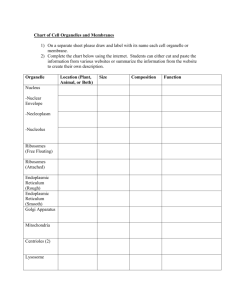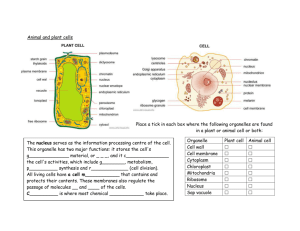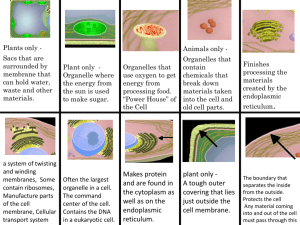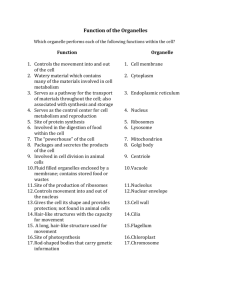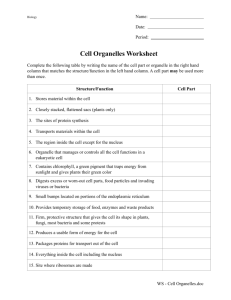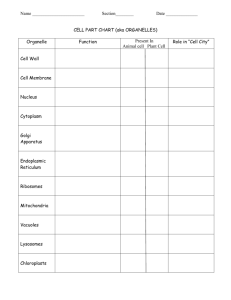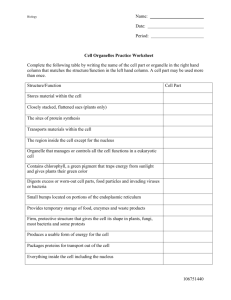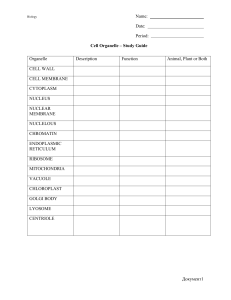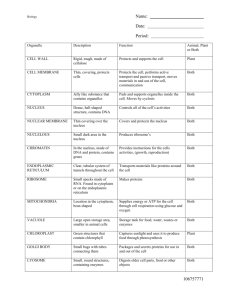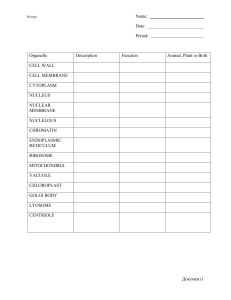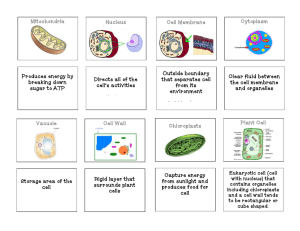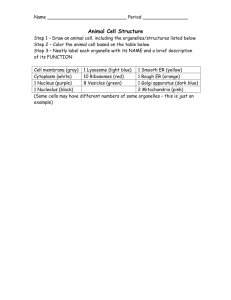Cell Theory & Organelles Worksheet: High School Biology
advertisement
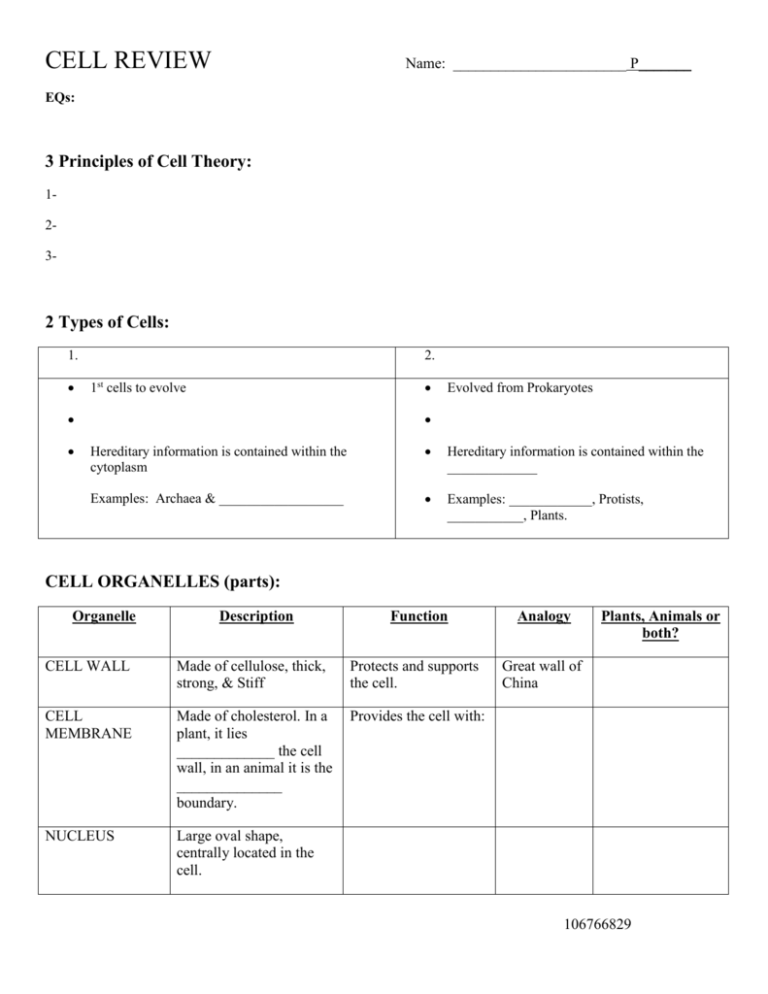
CELL REVIEW Name: _______________________ P_______ EQs: 3 Principles of Cell Theory: 123- 2 Types of Cells: 1. 2. 1st cells to evolve Evolved from Prokaryotes Hereditary information is contained within the cytoplasm Hereditary information is contained within the _____________ Examples: Archaea & __________________ Examples: ____________, Protists, ___________, Plants. CELL ORGANELLES (parts): Organelle Description Function CELL WALL Made of cellulose, thick, strong, & Stiff Protects and supports the cell. CELL MEMBRANE Made of cholesterol. In a plant, it lies _____________ the cell wall, in an animal it is the ______________ boundary. Provides the cell with: NUCLEUS Large oval shape, centrally located in the cell. Analogy Plants, Animals or both? Great wall of China 106766829 CYTOPLASM Clear, thick, jelly-like material Blood, Sidewalks GOLGI APPARATUS RIBOSOMES ENDOPLASMIC RETICULUM MITOCHONDRIA VACUOLES LYSOSOMES CHLOROPLAST SUMMARY: Page 2 Cell Organelles Homework Use your notes to fill in the chart Complete the following table by writing the name of the cell part or organelle in the right hand column that matches the structure/function in the left hand column. A cell part may be used more than once. Structure/Function Cell Part Stores material within the cell Closely stacked, flattened sacs (plants only) The sites of protein synthesis Transports materials within the cell The region inside the cell except for the nucleus Organelle that manages or controls all the cell functions in a eukaryotic cell Contains chlorophyll, a green pigment that traps energy from sunlight and gives plants their green color Digests excess or worn-out cell parts, food particles and invading viruses or bacteria Small bumps located on portions of the endoplasmic reticulum Provides temporary storage of food, enzymes and waste products Firm, protective structure that gives the cell its shape in plants, fungi, most bacteria and some protests Produces a usable form of energy for the cell Packages proteins for transport out of the cell Everything inside the cell including the nucleus Site where ribosomes are made The membrane surrounding the cell Provides support for the cell, has two “subparts” Name for the collection of DNA in the nucleus of eukaryotic cells Page 3 Consist of hollow tubes which provide support for the cell Small hair-like structures used for movement or sensing things Composed of a phospholipid bilayer Longer whip-like structures used for movement Put a check in the appropriate column(s) to indicate whether the following organelles are found in plant cells, animal cells or both. Organelle Plant Cells Animal Cells Organelle Cell Wall Lysosome Vesicle Mitochondria Chloroplast Nucleolus Chromatin Nucleus Cytoplasm Plasma membrane Cytoskeleton Central vacuole Endoplasmic reticulum Ribosome Golgi apparatus Vacuole Plant Cells Animal Cells Cell City Analogy In a far away city called Grant City, the main export and production product is the steel widget. Everyone in the town has something to do with steel widget making and the entire town is designed to build and export widgets. The town hall has the instructions for widget making, widgets come in all shapes and sizes and any citizen of Grant can get the instructions and begin making their own widgets. Widgets are generally produced in small shops around the city, these small shops can be built by the carpenter's union (whose headquarters are in town hall). Page 4 After the widget is constructed, they are placed on special carts which can deliver the widget anywhere in the city. In order for a widget to be exported, the carts take the widget to the postal office, where the widgets are packaged and labeled for export. Sometimes widgets don't turn out right, and the "rejects" are sent to the scrap yard where they are broken down for parts or destroyed altogether. The town powers the widget shops and carts from a hydraulic dam that is in the city. The entire city is enclosed by a large wooden fence, only the postal trucks (and citizens with proper passports) are allowed outside the city. Match the parts of the city (underlined) with the parts of the cell. 1. Mitochondria _____________________________________________ 2. Ribosomes _____________________________________________ 3. Nucleus _____________________________________________ 4. Endoplasmic Reticulum _____________________________________________ 5. Golgi Apparatus _____________________________________________ 6. Protein _____________________________________________ 7. Cell Membrane _____________________________________________ 8. Lysosomes ____________________________________________________________ 9. Nucleolus _____________________________________________ ** Create your own analogy below of the cell using a different model. Some ideas might be: a school, a house, a factory, or anything you can imagine** Page 5 ANSWER THE FOLLOWING QUESTIONS FOR HOMEWORK In what organelle does cellular respiration take place? Page 6 Name two storage organelles? What is the list of organelles that take part in protein synthesis? How is the nucleus involved in protein synthesis? What organelle is considered a “factory”, because it takes in raw materials and converts them to cell products that can be used by the cell? How does the membrane of the cell differ from the nuclear membrane? What advantages does this difference have for the nucleus? What do ribosomes do? Are they found freely floating in the cytoplasm? OR are they found attached to another organelle? OR both. Explain why this occurs. What does the endoplasmic reticulum do? What is the difference between rough ER and smooth ER? What is the ER doing that is different in each case? Page 7 What are lysosomes? What types of molecules would be found inside a lysosome? Why might a lysosome fuse with or link up with a food vacuole? In what organelle do molecules move from the ER to the Golgi bodies? What is a centriole? In what type of cell (plant or animal) is it found? What does it do for the cell? Page 8
